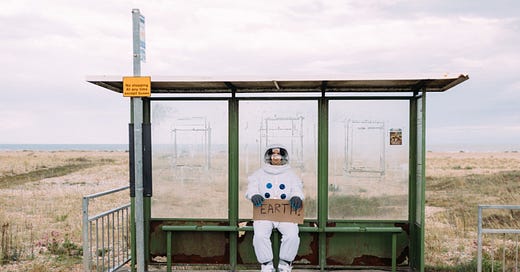Photo by A Koolshooter on Pexels
The Climate Psychology Alliance of North America conducted a discussion between the U.S. environmentalist and author Bill McKibbon and the English psychoanalyst Sally Weintrobe about her recent book Psychological Roots of the Climate Crisis.
Weintrobe’s main argument is that the self is divided between a narcissistic aspect, which she names The Exception, and a reality-based, caring part of the self that is often able to contain the exceptional self.
The Exception has three illusory beliefs:
I am entitled to see myself as ideal
I am entitled to have whatever I want
I am entitled to use omnipotent (magical) thinking to rid myself of any more unease about holding these beliefs
Weintrobe sees a link between the neoliberal politics ushered in by Reagan and Thatcher and The Exception: a kind of political enacting of the desires and illusory beliefs of The Exception, at the level of the political. There’s a feedback loop between a politics that tends to The Exception, and an increase in what she terms a politics of uncare. When The Exception becomes a national narrative of entitlement, threats to self and world such as climate change are avoided, denied, refused.
In the years since Regan and Thatcher, as politicians in the global north and multinational corporations continued to deny, delay, and disavow their culpability for the climate crisis, they soothed The Exception, not only at the level of the individual, but also at the political, delaying a reckoning with their politics’ true effects.
In our current moment, the bubble of denial that props up The Exception is breaking. And it is here that climate science finds itself in a paradoxical moment: reality is intruding on the consciousness of many who clung to denial. The impacts of global warming and population extinction can no longer be denied. The emergency is here. Climate scientists have won.
That victory, however, is now threatened by an under-anticipated secondary problem: whether the public can tolerate its exposure to reality, and the emotional impact of reckoning with the damage that has already been done. Climate reporters and scientists were, understandably, relentlessly focused on breaking down the counter arguments that sought to undermine the fact of climate change.
What was less thought through, however, was what would happen when the bubble broke. Suddenly, an enormous group of people in the global north have been plunged into awareness, terror, grief, and overwhelm. Frantic efforts to restore The Exception are still occurring, but the gig is up. The impacts of global warming on the global south have been occurring for decades, and those most vulnerable in the present have the fewest resources to maintain their survival.
The immensity of the challenge could be a siren song to return to denial, or a shock so immense as to induce mass paralysis. It is in this moment, when the political and collective rupture of denial is happening, that those of us who have the training to help ourselves and others stay “with” grief and rage have much to offer the movements working to eradicate environmental racism, ecological extinction, and the misallocation of resources across the globe. We can help people use their deep feelings as catalysts for engagement in collective action. And we can join with existing movements, helping those currently giving their all to sustain themselves, and to process their hope and grief.
You can watch the interview, here:
Some things I’ve been thinking about, after watching this interview:
How do patriarchy and white supremacy augment the Exception, for individuals who benefit from these structures?
How does the feminization of care impact the makeup of the climate movement, in terms of gender representation?
How can activists care for themselves, even as they are focusing their energy on building an effective movement? Should therapists become a secondary line of defense, backing up the activists with our knowledge of secondary trauma, emotion regulation, and the impact of structural violence and oppression on the self?
How do those who come from cultures that are non-individualist, or who are members of subcultural communities that prioritize care, view and understand the narcissistic elements of personality? Are there models of selfhood that do not conform to the Exception?
How might liberation psychology work in tandem with psychodynamic psychology to reinforce and increase the mass movement to overthrow Exceptional politics, introduce a politics of care, and combat ecological extinction?
Sources cited in the webinar, or by the authors cited in the webinar:
The Carbon Footprint Sham by Mark Kaufman
The Particular Psychology of Destroying a Planet by Bill McKibbon
Big Oil Coined “Carbon Footprints” to Blame Us For Their Greed. Let’s Keep Them On the Hook by Rebecca Solnit
Rhetoric and frame analysis of ExxonMobil’s climate change communications by Geoffrey Supran and Naomi Oreskes
Psychological Roots of the Climate Crisis by Sally Weintrobe













Share this post